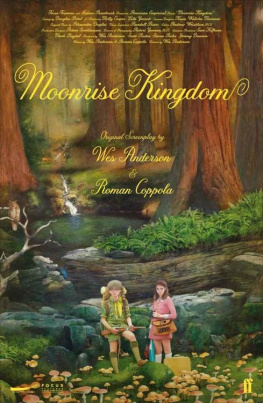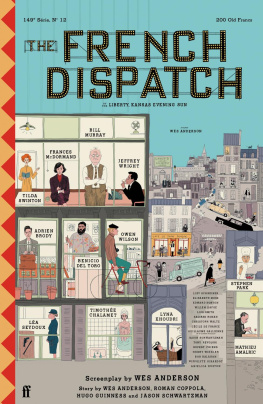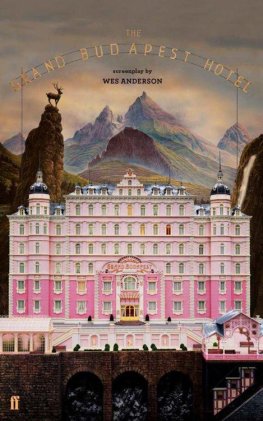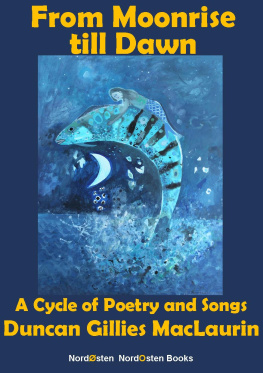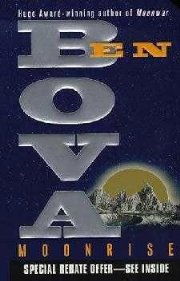Wes Anderson - Moonrise Kingdom
Here you can read online Wes Anderson - Moonrise Kingdom full text of the book (entire story) in english for free. Download pdf and epub, get meaning, cover and reviews about this ebook. City: London, year: 2012, publisher: Faber and Faber, genre: Home and family. Description of the work, (preface) as well as reviews are available. Best literature library LitArk.com created for fans of good reading and offers a wide selection of genres:
Romance novel
Science fiction
Adventure
Detective
Science
History
Home and family
Prose
Art
Politics
Computer
Non-fiction
Religion
Business
Children
Humor
Choose a favorite category and find really read worthwhile books. Enjoy immersion in the world of imagination, feel the emotions of the characters or learn something new for yourself, make an fascinating discovery.
- Book:Moonrise Kingdom
- Author:
- Publisher:Faber and Faber
- Genre:
- Year:2012
- City:London
- Rating:4 / 5
- Favourites:Add to favourites
- Your mark:
- 80
- 1
- 2
- 3
- 4
- 5
Moonrise Kingdom: summary, description and annotation
We offer to read an annotation, description, summary or preface (depends on what the author of the book "Moonrise Kingdom" wrote himself). If you haven't found the necessary information about the book — write in the comments, we will try to find it.
Moonrise Kingdom — read online for free the complete book (whole text) full work
Below is the text of the book, divided by pages. System saving the place of the last page read, allows you to conveniently read the book "Moonrise Kingdom" online for free, without having to search again every time where you left off. Put a bookmark, and you can go to the page where you finished reading at any time.
Font size:
Interval:
Bookmark:
&
Roman Coppola

Then you set the voices to them, and you set the music to them, and, basically, you make the whole movie before you shoot it. And we did quite a bit of that with this new, non-animated movie.
We had a lot of the same people working on it. So, we would say: with this sequence, just so we dont mess it up, lets make an animated version of the whole thing. And we did a lot of the movie that way. In fact, we ended up going to the locations, and we used ourselves as stand-ins for the actors, and said: lets pre-shoot this scene, and pre-edit it. Of course, its nothing like the movie because its not the right people, and there were rarely any props or costumes or anything but we were able to work out what we needed for the scene.
So we were the most prepared on a day-to-day basis that Ive ever been.
This film was the most under-budgeted of all the movies Ive done. I mean, we knew it was all we had, it was the most stretched one for the money but we were okay because everybody was clear: were not going to make it if we dont figure it out one thousand per cent, and then everybodys got to stick to the program. In the end, it worked out fine. So we did use a lot of what we learned from the animated one.
The other thing is that we built more sets. With Fantastic Mr Fox we built everything because you have no choice. You have to build the room, and you have to build the desk, and you have to build the paperclip, if you want one and I liked that.
In that case, you might as well design your own paper clip.
So in Moonrise , with the opening sequence in the house, there was no way we could shoot it the way I wanted if it wasnt built exactly to suit the shots. But I wouldnt have even thought to do that before I did an animated movie. I remember that American Express commercial you did it was one long travelling shot. Im aware of when I started thinking of doing shots in that way. During Rushmore we had a scene that took place on a baseball diamond, and we got there, with the crowds and everything, and it had rained the night before and the field was all mud. Only this little strip of grass on the side was dry.
I had had something worked out with a Steadicam and all kinds of stuff, and all that went out the window.
So, whatre we going to do, whatre we going to do? Maybe well do it all on the little dry bit on the side. So we built this track and shot the scene and I liked the way it turned out. I remember all that fuss about the camera movement in Taxi Driver De Niro is on the phone and the camera moves away from him to look down the corridor. People said that the camera isnt supposed to act so independently. Of course the camera can leave the characters. Woody Allen does that all the time.
He said, in a documentary, that Gordon Willis said to him that nobody has to be in the shot. You can leave them and then come back. Theres a shot in the film when the two kids, Sam and Suzy, are on the beach it begins with Sam painting and then the camera moves away from him to where Suzy is posing for him on a rock, and then as the camera moves past her towards the sea, Sam comes in from the bottom of the frame. It makes the film 3D, in a way. Its not a flat surface. Its a surface that has dimensions to it.
I like that. Its 3D, but no glasses. On the other hand, people might object that the camera is calling attention to itself. I remember reading something Mike Nichols said about show-offy things with the camera. He was talking about Citizen Kane the most show-offy movie of all time. He said movies want that, movies like it when you try something strange or do something adventurous.
Even the very most reserved opposite extreme, like Bresson, he makes something out of the form of it he makes it aloof with the camera.
I think movies tend to respond to a little extra juice. Of course, you have to get it right, but the movie will absorb it, if you see what I mean. It brings an excitement. With Brian De Palma, for example, all the flourishes and bravura thats the music we came to listen to. Whats strange is that when you see a film from the seventies now and notice how Altman used to do those shots which zoomed into scenes when you see those films, you immediately know its from the seventies. But theres no one like Altman.
Theres no one who dollies and zooms, no one whos saying: Lets look over here, were going to listen to these guys for a moment, then were going to come over here, and then well cut to another one while its moving. The camera is like himself thinking, Im interested in what these actors might do with our scene this time. I used to hate the zooms. In Bottle Rocket theres not one zoom. We didnt even change lenses on the whole movie. But your eye doesnt zoom.
I can look at you, then look across the room at the jacket hanging on the peg on the far wall, but Im not aware of my eye zooming. The eye doesnt zoom, but your brain does. Your brain will look across the room and see whats hanging from the peg and focus on it.
I remember Tarantino saying: a zoom is analytical. Youre not moving towards it its not movement, its study. Youve spent the day being interviewed about the film was it okay? Yes, it was fine. With some questions, I dont know what to say.
All you really have to work with is the ideas you come up with.
Maybe some people have an endless supply of variations, and theyre just picking and choosing from all their millions of ideas. Bergman never ran out. He never had a gap. Even when he had to leave Sweden for tax reasons, he went and made five films in Germany. But my experience is when I get the idea for a film the idea of: this will do, this will fill the space I feel good, weve got another thing; Im lucky enough to come up with one way of doing it. Whyd I do it that way? Because I was lucky enough to think it up.
With the help of my collaborators, by the way. Youre not thinking in terms of how will my audience respond to this? Its not even close to that. All Im really thinking is: can we make this work, can we add something to this to make it better. And it never gets to: who is this working for? Who is this not working for? Or who is going to like this more? Its never close to contemplating that. Usually its: can we convince ourselves that this is good? Itll never meet your expectations anyway, so you make it work as best you can. Nic Roeg talks about the situation film-makers often find them selves in.
You turn up at a location to shoot a scene say, a farewell between two lovers on a beach and its raining and the first assistant immediately says, Lets go back to the studio and do the weather-cover scenes. Nics impulse has always been to let the circumstances dictate what the scene is like that even if you imagined the scene in bright sunlight, the rain might bring something unexpected, the womans tears might mirror the rain falling around her. Rain, for instance, is one of those things that if you can actually do a scene in the real rain, youve just bought something very expensive . Adding rain, bringing in the rain machine, never has the depth of real rain or the kind of light you get with real rain. Its kind of magical. Its the same with snow the whole world is changed.
Font size:
Interval:
Bookmark:
Similar books «Moonrise Kingdom»
Look at similar books to Moonrise Kingdom. We have selected literature similar in name and meaning in the hope of providing readers with more options to find new, interesting, not yet read works.
Discussion, reviews of the book Moonrise Kingdom and just readers' own opinions. Leave your comments, write what you think about the work, its meaning or the main characters. Specify what exactly you liked and what you didn't like, and why you think so.

